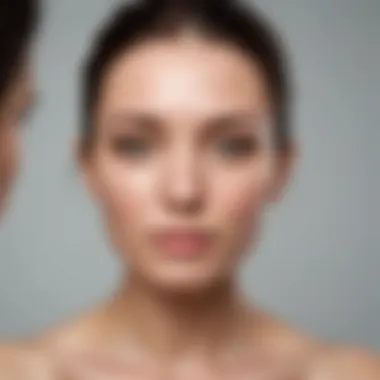Effective Strategies for Clearing Acne and Achieving Radiant Skin


Trendy Haircut Trends
As we embark on our journey to delve into the realm of effective acne elimination, it is paramount to first understand the significance of addressing skincare concerns holistically. Acknowledging the intricate relationship between lifestyle choices, skincare practices, and professional interventions plays a pivotal role in combating persistent acne woes.
Men's Fashion Trends
Upon laying the foundation of comprehending acne treatment's multifaceted nature, we transition into exploring the parallels between skincare routines and men's fashion trends. Understanding how grooming habits can intertwine with sartorial choices presents a unique opportunity to not only foster clearer skin but also exude confidence through impeccable style.
Unveiling the current sartorial landscape for men's clothing unveils a tapestry of style possibilities waiting to be embraced. From classic silhouettes to avant-garde ensembles, each garment holds the power to elevate one's aesthetic sensibilities and mirror the journey towards healthier, clearer skin.
Dispensing discerning advice on accessorizing with poise and finesse proves instrumental in curating timeless looks that resonate with contemporary fashion sensibilities. By integrating must-have accessories seamlessly into outfits, men can effortlessly elevate their fashion quotient while simultaneously streamlining their skincare regimens for optimal efficacy.
Style Tips and Tricks
Building upon the foundation of a synergistic relationship between skincare and fashion choices elucidates a broader canvas where style tips and grooming hacks converge. Essential grooming tips catered towards men seeking to redefine their style manifesto not only nurture confidence but also signify a commitment to self-care and personal grooming.
In the tapestry of fashion innovations, mastering the art of mixing and matching different clothing pieces emerges as a transformative skill set. From color palettes to fabric textures, each decision unfolds a new chapter in the narrative of personal style, harmonizing the pursuit of clear skin with the pursuit of sartorial excellence.
Guiding sartorial aficionados through seasonal trends and outfit inspirations reinforces the notion that skincare transcends mere topical applications - it embodies a lifestyle choice. By responding to seasonal shifts, men can adapt their skincare routines concomitantly, resonating with fashion's dynamic evolution and celebrating the amalgamation of skincare efficacy and style prowess.
Trend Alerts
Culminating our exploration into effective acne eradication transcends the physical realm into a realm where personal expression interlaces with skincare diligence. How to dress for specific events extends beyond mere sartorial deliberations; it bridges the gap between self-presentation and proactive skincare advocacy.
Delving into updates on new collections from esteemed fashion houses unveils a bridge connecting skincare routine enhancements to embracing novel fashion sensibilities. The analysis of celebrities' fashion choices not only offers a window into high-profile personas but also serves as a beacon guiding men towards harnessing their style narratives while imbibing skincare best practices.
In synthesizing the lessons archived within each segment, we unite skincare efficacy with style exuberance, emphasizing that effective acne elimination is not merely a destination but a transformative lifestyle journey. Embracing the interplay between style consciousness and skincare diligence forms the crux of this comprehensive guide, charting a roadmap towards clearer skin and heightened fashion acumen.
Understanding Acne
Acne, a common skin condition that affects many individuals, holds a significant position in the realm of skincare discussions. Understanding the underlying causes and manifestations of acne is paramount for those seeking effective remedies. In this article, we dissect the intricacies of acne, shedding light on various factors that contribute to its onset and persistence. By delving into the complexities of acne, readers can gain a comprehensive perspective on how to combat this skin concern efficiently.
What Causes Acne?
Hormonal Imbalances
One of the primary culprits behind acne development is hormonal imbalances. These fluctuations in hormone levels can trigger excessive sebum production and lead to the formation of pesky pimples. Understanding the role of hormonal imbalances in acne is crucial for devising targeted treatment approaches. Despite its challenging nature, addressing hormonal imbalances effectively can significantly improve skin health and reduce acne breakouts.
Excess Sebum Production
Excessive sebum production is another key player in the acne saga. When the sebaceous glands produce an abundance of oil, the skin becomes prone to clogged pores and acne flare-ups. Exploring the nuances of excess sebum production in relation to acne paves the way for tailored skincare routines and preventive measures. By managing sebum levels, individuals can mitigate the impact of this factor on their skin condition.
Clogged Pores
Clogged pores act as breeding grounds for acne-causing bacteria, exacerbating skin issues and promoting inflammation. Understanding how clogged pores contribute to acne formation is critical for adopting cleansing practices that maintain clear and healthy skin. By addressing this specific aspect of acne development, individuals can refine their skincare regimens and minimize the risk of pore blockages, fostering a smoother complexion.
Types of Acne
Papules
Papules represent a type of acne characterized by small, raised bumps on the skin. These inflammatory lesions can be sensitive to touch and often signal ongoing skin irritation. Exploring the distinct features of papules sheds light on their treatment requirements and potential triggers. By differentiating papules from other forms of acne, individuals can tailor their skincare routines to address these particular blemishes effectively.


Pustules
Pustules, defined by pus-filled lesions that appear as whiteheads or red bumps, present a common form of inflammatory acne. Understanding the distinct characteristics of pustules is essential for implementing targeted skincare strategies and preventing their recurrence. By dissecting the nature of pustules in the context of acne management, individuals can adopt proactive measures to minimize their impact on overall skin health.
Cysts
Cysts are severe, deep-rooted blemishes that develop beneath the skin's surface and pose a greater risk of scarring. These painful nodules require specialized treatment and careful handling to avoid long-term skin damage. Analyzing the unique features of cystic acne equips individuals with the knowledge needed to seek appropriate interventions and prevent complications. By addressing cystic acne promptly, individuals can improve skin clarity and prevent adverse outcomes.
Impact of Acne on Mental Health
Low Self-Esteem
Acne can severely impact an individual's self-esteem, leading to feelings of inadequacy and self-doubt. Dealing with low self-esteem issues arising from acne requires a holistic approach involving skincare treatments and psychological support. Understanding the link between acne and self-esteem allows individuals to navigate these challenges with resilience and seek effective coping strategies.
Anxiety
The presence of acne can trigger anxiety in individuals, causing distress and affecting their quality of life. Exploring the connection between acne and anxiety underscores the importance of addressing both skin concerns and mental well-being. By acknowledging the anxiety-inducing effects of acne, individuals can prioritize self-care practices and seek professional guidance to alleviate psychological distress.
Depression
Acne-related depression is a common phenomenon characterized by persistent feelings of sadness and hopelessness. Managing depression associated with acne necessitates a multifaceted approach that includes therapy, self-care, and medical interventions. Recognizing the impact of acne on mental health empowers individuals to address depressive symptoms proactively and cultivate a positive mindset towards skincare routines and overall well-being.
Lifestyle Adjustments
In this elaborate guide on rectifying acne issues, we delve into the significance of Lifestyle Adjustments. Shifting towards a healthier lifestyle encompasses various aspects that are pivotal in combating acne. Lifestyle Adjustments span beyond just topical remedies, emphasizing holistic changes that can aid in achieving clearer skin. By zeroing in on factors such as diet, stress management, and skincare routines, individuals can take proactive steps towards addressing acne concerns. Understanding the importance of Lifestyle Adjustments underscores the fundamental role lifestyle choices play in skin health.
Importance of Diet
Within the realm of Lifestyle Adjustments, the role of diet holds substantial importance. Unpacking the significance of diet, we explore the impact of elements such as sugar and dairy on skin health. The inclusion of certain foods rich in antioxidants is advocated for their ability to combat inflammation and support skin renewal. Emphasizing the importance of hydration plays a crucial role in maintaining skin elasticity and promoting overall skin health.
Role of Sugar and Dairy
Delving deeper into the role of sugar and dairy in skin health, we uncover their potential impact on acne. Balancing sugar intake and opting for dairy alternatives can be pivotal in minimizing breakouts. Understanding the biochemical processes that link sugar and dairy consumption to acne can empower individuals to make informed dietary choices, steering clear of potential triggers that exacerbate skin issues.
Incorporating Antioxidants
The incorporation of antioxidants into one's diet showcases promising results in promoting skin clarity. Antioxidant-rich foods such as berries, leafy greens, and nuts offer protection against free radicals that contribute to skin damage. Introducing these nutrient-dense options can aid in fortifying the skin's natural defenses and fostering a healthier complexion.
Hydration
Apart from diet, maintaining adequate hydration levels is a cornerstone of skin health. Water plays a crucial role in regulating bodily functions and supporting skin cell renewal. Ensuring optimal hydration levels not only aids in flushing out toxins but also helps in maintaining skin elasticity, reducing the likelihood of dryness and breakouts.
Stress Management
Effective stress management is another crucial facet of Lifestyle Adjustments that influences skin health. Incorporating mindfulness techniques, engaging in regular exercise, and prioritizing adequate sleep are key strategies in mitigating stress levels and fostering overall well-being. The interplay between stress and skin conditions underscores the need to adopt holistic approaches in addressing acne concerns.
Skincare Routine
Transitioning to a tailored skincare routine forms an integral part of combating acne. The meticulous selection of products and adherence to a consistent regimen can yield transformative results in skin clarity and health. By focusing on elements like gentle cleansing, exfoliation, and moisturization, individuals can establish a robust skincare routine that nurtures and revitalizes their skin.
Gentle Cleansing


Commencing with gentle cleansing sets the foundation for an effective skincare routine. Opting for mild cleansers that cater to sensitive skin helps in removing impurities without stripping the skin's natural oils. Gentle cleansing not only prevents pore congestion but also sets the stage for the absorption of subsequent skincare products, enhancing their efficacy.
Exfoliation
Exfoliation plays a crucial role in sloughing off dead skin cells and promoting cell turnover. Incorporating exfoliants containing salicylic acid or fruit enzymes aids in unclogging pores and smoothing the skin's texture. However, moderation is key to prevent over-exfoliation, which can lead to skin irritation and inflammation.
Moisturization
Completing the skincare routine with adequate moisturization is paramount for maintaining skin hydration and barrier function. Opting for non-comedogenic moisturizers helps in preventing excess oil production while ensuring adequate moisture levels. Hydrated skin is better equipped to combat acne-causing bacteria and inflammation, emphasizing the significance of moisturization in acne management.
Professional Treatments
In the domain of combating acne, professional treatments play a pivotal role in resolute skin rejuvenation. These interventions, supervised by dermatologists, offer profound solutions for stubborn acne woes that transcend routine skincare practices. By delving into the realm of professional treatments, individuals embark on a path that merges scientific expertise with personalized care.
Dermatological Interventions
Prescription Medications
Prescription medications constitute a cornerstone of dermatological interventions in the battle against acne. Specifically formulated to target underlying causes of acne such as sebum overproduction or bacterial proliferation, prescription medications demonstrate efficacy in managing moderate to severe cases. The key characteristic of prescription medications lies in their potency and targeted action, regulating sebum production, calming inflammation, and inhibiting bacterial growth. This makes them a preferred choice when conventional treatments prove ineffective or inadequate. While boasting remarkable results, prescription medications may pose side effects such as dryness or photosensitivity, necessitating careful monitoring.
Chemical Peels
Within the spectrum of professional treatments, chemical peels emerge as a potent exfoliation method to address acne-related concerns. By utilizing chemical solutions to remove dead skin cells and unclog pores, chemical peels aid in refining skin texture and reducing acne lesions. The key characteristic of chemical peels lies in their ability to accelerate cellular turnover, stimulating fresh skin growth and diminishing acne scars. This modality is favored for its versatility, catering to various skin types and complexities. Despite its efficacy, chemical peels may induce redness or flaking post-treatment, necessitating adequate post-care precautions.
Laser Therapy
Laser therapy signifies a cutting-edge approach within dermatological interventions, offering precise and targeted solutions for acne management. By emitting controlled wavelengths of light to alleviate inflammation and diminish acne-causing bacteria, laser therapy showcases notable effectiveness in reducing active acne and preventing future breakouts. The standout feature of laser therapy is its non-invasive nature and minimal downtime post-treatment. This makes it an attractive option for individuals seeking rapid results and minimal disruption to daily routines. However, laser therapy may entail a higher financial investment and necessitate multiple sessions for optimal outcomes.
Clinical Procedures
Extraction
Extraction stands out as a fundamental clinical procedure aimed at resolving stubborn acne lesions through manual removal. By proficiently extracting comedones and impurities from pores, dermatologists facilitate the elimination of sebum plugs and acne-causing debris. The defining trait of extraction lies in its immediate efficacy in relieving pore congestion and alleviating inflammation, resulting in visibly clearer skin post-treatment. Despite its rapid outcomes, extraction may induce temporary redness or sensitivity, underscoring the importance of post-extraction skincare adherence.
Microneedling
Microneedling emerges as an innovative clinical procedure harnessing the regenerative capacity of the skin to address acne scarring and textural irregularities. Through the creation of controlled micro-injuries using fine needles, microneedling induces collagen production and skin rejuvenation, leading to smoother and more refined skin texture. The distinctive aspect of microneedling lies in its ability to improve acne scars and enhance topical product absorption, amplifying treatment benefits. While generally well-tolerated, microneedling may cause transient redness or mild swelling post-procedure, necessitating diligent post-care practices.
Light Therapy
Light therapy epitomizes a non-invasive clinical procedure that harmonizes light wavelengths to target acne-causing bacteria and reduce sebum production. By emitting specific wavelengths of light to penetrate skin layers, light therapy exhibits antimicrobial effects and sebaceous gland modulation, culminating in diminished acne activity and inflammation. The salient feature of light therapy is its gentle yet efficacious nature, suitable for individuals seeking gentle yet effective acne management solutions. However, light therapy may require consistent sessions for optimal results and entail considerations for eye protection during treatment sessions.
Natural Remedies
In the realm of combating acne, Natural Remedies stand as a crucial aspect that often garners significant attention for their potential benefits and holistic approach. With a surge in individuals veering towards a more organic and sustainable lifestyle, the utilization of natural remedies has gained substantial traction. Within the context of this article, focusing on Natural Remedies sheds light on alternative solutions that align with the theme of skincare without harsh chemicals or invasive procedures. Addressing acne through natural means not only emphasizes a gentler approach towards skincare but also showcases the efficacy of ingredients derived from nature's bounty. The inclusion of Natural Remedies in this narrative aims to provide readers with a comprehensive understanding of how common household items or plant-based extracts can play a pivotal role in acne management.
Tea Tree Oil
Anti-Inflammatory Properties
Delving into the sphere of Tea Tree Oil's Anti-Inflammatory Properties, we encounter a potent aspect that contributes significantly to the overarching goal of combating acne effectively. The key characteristic of its anti-inflammatory nature lies in its ability to soothe irritated skin, reduce redness, and alleviate swelling commonly associated with acne breakouts. Sought after for its calming effects, Tea Tree Oil offers a natural remedy that targets inflammation at its core, promoting a more balanced skin condition. Despite some individuals experiencing sensitivity to pure Tea Tree Oil, its anti-inflammatory properties remain a popular choice for those seeking a botanical approach to skincare. The unique feature of its anti-inflammatory prowess lies in its effective yet gentle manner of pacifying skin inflammation, making it a favorable option for incorporating into skincare routines.


Antibacterial Effects
Transitioning to the Antibacterial Effects of Tea Tree Oil uncovers a fundamental asset in the fight against acne. The key characteristic of its antibacterial properties resides in its ability to combat acne-causing bacteria like Propionibacterium acnes, thus reducing the likelihood of new breakouts. Regarded for its natural antimicrobial properties, Tea Tree Oil presents itself as a beneficial choice for purifying the skin without harsh chemical agents commonly found in conventional acne treatments. While some individuals may experience skin dryness with prolonged use, the advantages of Tea Tree Oil's antibacterial effects align with the ethos of natural remedies, advocating for a gentler yet effective approach to acne management.
Application Guidelines
Navigating through the Application Guidelines of Tea Tree Oil unravels essential insights for its optimal utilization in acne treatment. The key characteristic of these guidelines emphasizes the importance of proper dilution to prevent skin irritation and maximize efficacy. Tea Tree Oil's characteristic potency necessitates cautious application, typically requiring dilution with carrier oils like jojoba or almond oil before direct skin contact. This prudent approach not only ensures safe usage but also enhances the oil's absorption into the skin, magnifying its antibacterial and anti-inflammatory benefits. The unique feature of these guidelines lies in their role as a roadmap for users to leverage Tea Tree Oil effectively in their skincare regimen, striking a balance between potency and skin sensitivity.
Aloe Vera
Soothing Effects
Turning our attention to Aloe Vera's Soothing Effects, we unravel a cornerstone element that bolsters the overall objective of combating acne with natural remedies. The key characteristic of its soothing properties lies in its ability to calm irritated skin, reduce redness, and provide a cooling sensation that alleviates discomfort commonly associated with acne flare-ups. Revered for its hydrating qualities and mild astringent properties, Aloe Vera emerges as a popular choice for individuals seeking a gentle yet effective solution to skin inflammation. The unique feature of its soothing effects lies in the plant's innate ability to restore skin balance without causing sensitivity, making it a versatile inclusion in acne skincare routines.
Healing Properties
Exploring Aloe Vera's Healing Properties unveils a treasure trove of benefits that amplify its significance in acne management. The key characteristic of its healing prowess resides in its capacity to promote skin regeneration, accelerate wound healing, and reduce inflammation, thereby expediting the recovery process from acne lesions. Praised for its anti-inflammatory and antimicrobial attributes, Aloe Vera offers a natural remedy that not only addresses existing skin issues but also fortifies skin health in the long run. While individuals with latex sensitivity may need to exercise caution, the advantages of Aloe Vera's healing properties align closely with the ideals of promoting skin wellness through botanical interventions.
Use in Skincare
Delving into Aloe Vera's Use in Skincare unravels a multifaceted approach to harnessing its potential for acne treatment. The key characteristic of its inclusion in skincare routines emphasizes its versatility as a standalone remedy or as a complementary ingredient in topical products. Aloe Vera's reputation as a hydrating agent, anti-inflammatory solution, and skin-soothing emollient positions it as a valuable asset in addressing various facets of acne management. The unique feature of its use in skincare lies in its compatibility with different skin types, making it a universally appealing choice for individuals navigating the complexities of acne-prone skin. By understanding the diverse applications of Aloe Vera in skincare, readers can leverage its benefits judiciously to cultivate a healthier complexion rooted in natural efficacy.
Preventive Measures
Preventive measures play a fundamental role in managing acne effectively. By adopting specific practices and habits, individuals can proactively reduce the occurrence of breakouts and maintain clearer skin. These measures encompass various aspects of skincare and lifestyle modifications aimed at promoting skin health and preventing acne flare-ups. Implementing preventive measures not only addresses existing acne but also helps in controlling future breakouts, emphasizing the importance of a holistic approach in acne management.
Avoiding Triggers
When discussing preventive measures for acne, it is crucial to highlight the significance of avoiding triggers that can exacerbate skin conditions. One common trigger is overwashing, wherein frequent and aggressive cleansing strips the skin of its natural oils, leading to increased sebum production and potential pore blockages. Overwashing disrupts the skin's natural balance, causing irritation and inflammation, ultimately perpetuating the acne cycle.
Overwashing
Overwashing is a prevalent mistake in skincare routines. Many individuals believe that washing the face multiple times a day will keep acne at bay; however, excessive cleansing can strip the skin of its protective barrier, triggering an overproduction of sebum to compensate for the lost oils. This results in clogged pores and increased acne breakouts. While maintaining clean skin is essential, overwashing can do more harm than good, emphasizing the importance of gentle yet effective cleansing techniques in acne management.
Touching Skin Frequently
Another trigger to avoid is frequently touching the skin, especially with unwashed hands. Touching the face transfers dirt, bacteria, and oils onto the skin, potentially leading to pore blockages and infections. Constantly touching the face can increase acne severity and worsen existing breakouts. Breaking this habit is essential in acne prevention, highlighting the need for maintaining clean hands and refraining from unnecessary contact with the face.
Excessive Sun Exposure
Excessive sun exposure is often underestimated as a trigger for acne flare-ups. While sunlight can initially dry out existing acne lesions, prolonged exposure can lead to skin dehydration and increased oil production, ultimately aggravating acne. Moreover, UV radiation can cause skin damage and inflammation, exacerbating existing acne symptoms. Limiting sun exposure and using non-comedogenic sunscreen are crucial in protecting the skin from harmful UV rays and reducing the risk of acne exacerbation.
Regular Consultation
In addition to avoiding triggers, seeking regular consultation with skincare professionals is pivotal in acne management. Scheduled skin check-ups enable early detection of skin issues and provide personalized recommendations for effective treatment. Dermatologists offer tailored advice on skincare routines, suitable products, and advanced treatments, ensuring comprehensive care for individuals struggling with acne.
Skin Check-Ups
Routine skin check-ups involve thorough examinations by dermatologists to assess skin health, identify potential concerns, and tailor treatment plans accordingly. These check-ups help in monitoring skin condition progression, tracking the effectiveness of current treatments, and making necessary adjustments. Early detection of changes in the skin enables timely interventions, preventing worsening of acne symptoms and promoting faster recovery.
Professional Advice
Professional advice from dermatologists is invaluable in navigating the complexities of acne management. Experts provide evidence-based recommendations on skincare products, treatments, and lifestyle adjustments tailored to individual needs. Professional guidance ensures that individuals receive accurate information, avoid harmful practices, and optimize their acne treatment outcomes effectively.
Monitoring Progress
Monitoring progress is essential in evaluating the effectiveness of acne management strategies and tracking improvements in skin health. Regularly assessing skin changes, documenting acne severity, and noting treatment responses allow individuals to make informed decisions regarding their skincare routines. Monitoring progress facilitates adjustments in treatment plans, ensuring continuous progress towards clearer, healthier skin.















